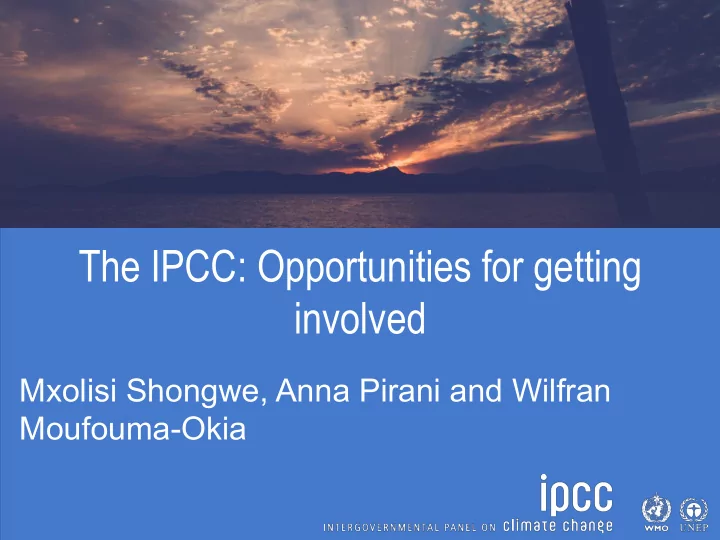

The IPCC: Opportunities for getting involved Mxolisi Shongwe, Anna Pirani and Wilfran Moufouma-Okia
What is IPCC? • The IPCC is an intergovernmental and scientific body with 195 country members • The IPCC was established in 1988 by WMO and UNEP to assess, on a comprehensive, objective, open and transparent basis, the scientific, technical and socio-economic information relevant to understanding human-induced climate change, its potential impacts, and options for adaptation and mitigation • It does not undertake new research, nor does it monitor climate- related data, instead, it conducts assessments of knowledge on the basis of published and peer-reviewed scientific and technical literature
IPCC Working Groups , Task Force & Reports Working Group I (WGI) assesses the physical science basis of climate change Working Group II (WGII) assesses climate change impacts, adaptation and vulnerability Working Group III (WGIII) assesses options for limiting greenhouse gas (GHG) emissions and mitigating climate change The Task Force on National Greenhouse Gas Inventories (TFI) to oversees the IPCC National GHG Inventories Programme Special Reports can involve one or more Working Groups
What is next for the IPCC? IPCC Decision XLIII-5 “To take the outcomes of the 21st Conference of the Parties to the United Nations Framework Convention on Climate Change (UNFCCC) into consideration when determining the IPCC programme of work and products for the sixth IPCC assessment cycle” AR6 cycle Special Reports on Impacts of global warming of 1.5 ºC above pre-industrial levels and related global greenhouse gas emission pathways Climate change and oceans and the cryosphere Climate change, desertification , land degradation , sustainable land management , food security , and greenhouse gas fluxes in terrestrial ecosystems
What is next for the IPCC? (cont.) AR6 Main Report Expected to be released in three working group contributions in 2020/2021 and a Synthesis Report in 2022 AR6 Methodology Report update Methodology Report on National Greenhouse Gas Inventories by 2019 TFI Cities Attention on cities in AR6 including an International Conference to be held in 2018 and a Special Report on Cities in AR7
How the IPCC produces its reports?
Timeline for SR 1.5°C
Timeline for SR: Climate change and oceans and the cryosphere
Timeline for SR: Climate change, desertification , ….
Timeline for AR6: WGI
Timeline for AR6: WGII
Timeline for AR6: WGIII
Conclusions • The IPCC is putting a lot of emphasis on increasing the involvement of experts from DCs • Three Working Group Assessment Reports, three Special Reports, a Methodology report will be produced during the AR6 cycle • Roles to become a CLA, LA, and Review Editor go through the IPCC procedural nomination/selection process • Other opportunities exist: Volunteer Chapter Scientist, Contributing Authors, Government and Expert Reviewers • Note: To be nominated doesn’t guarantee that one will be selected. KEEP ENGAGING WITH THE IPCC
The End 1552pp 1007pp 882pp 588pp 414pp
The End 1846pp 987pp
THANK YOU FOR YOUR ATTENTION! For more information: Website: http://ipcc.ch/ IPCC Secretariat: ipcc-sec@wmo.int IPCC Press Office: ipcc-media@wmo.int Find us on: IPCC @IPCC_CH IPCC https://www.linkedin.com/company/ipcc http://www.slideshare.net/ipcc-media/ https://www.flickr.com/photos/ipccphoto/sets/ presentations https://www.youtube.com/c/ipccgeneva https://vimeo.com/ipcc
Recommend
More recommend